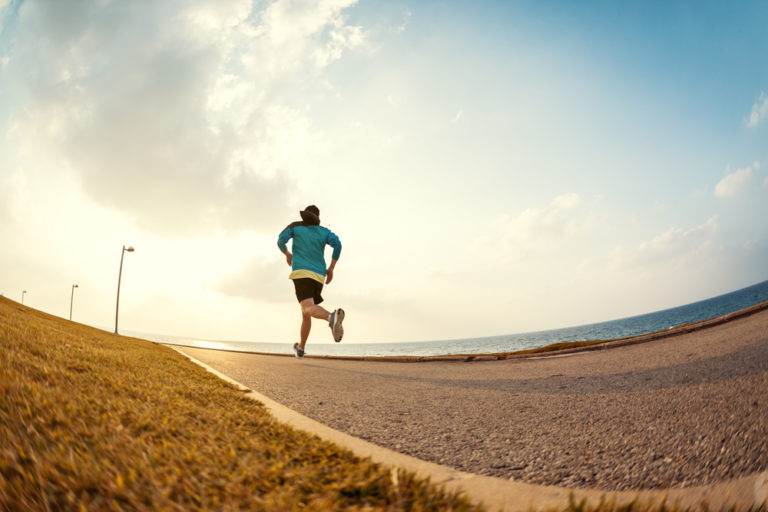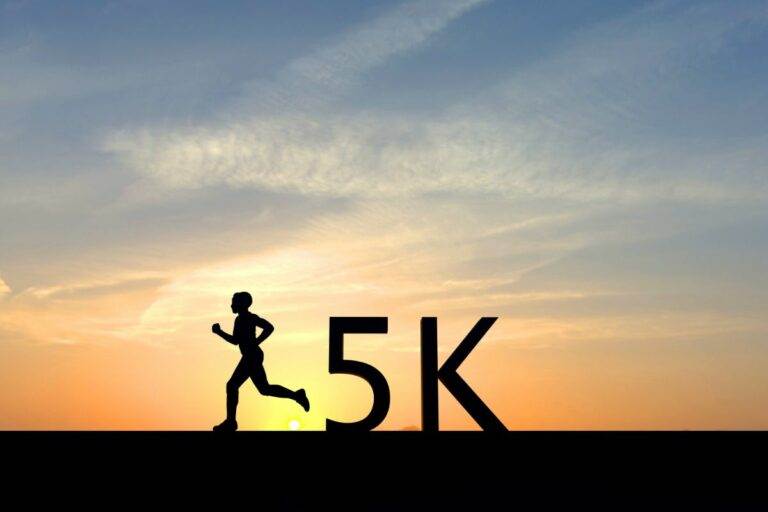What is the Average Human Running Speed (and How to Improve Yours)

The average human running speed is around 6 miles per hour. This figure takes into account hobbyists, non-runners, and athletes, creating a good scope for the general speed of a typical person.
However, speed varies greatly depending on age, gender, and fitness level. Some people can run much faster than this, while others run more slowly.
- The average human running speed is 6 miles per hour.
- Speed varies depending on age, gender, and fitness level.
- For example, between the ages of 16 to 35, the average time to complete a mile race is 10 minutes.
- In comparison, it takes 15 minutes for individuals aged 65 and onwards.
But, in the end, the average speed depends on how it is counted.
Training Speed Vs Average Speed
Using running equipment such as Fitbit and Strava, the data shows the average speed of a runner in training is 9.53 miles per hour.
This data is collected using millions of Strava users. It shows that although non-runners can still reach fast speeds, training can help you push further than the expected average of 6 miles per hour.
As a comparison, the typical speeds of other activities:
- Casual walking 2-3 mph
- Speed walking 4 mph
- Jogging 4-5 mph
Average Speed Vs Age
For a more detailed breakdown of averages, here is the typical time frame based on age and a mile run:
- Between the ages of 16 to 35, you can expect an average time of 10 minutes to complete a mile race.
- Between the ages of 36 to 49, that number jumps to 12 minutes.
- Between the ages of 50 and 65, it takes 13 minutes to complete a mile.
- Lastly from the age of 65 onwards, the average time reaches 15 minutes to complete a mile race.
These mile times are for healthy individuals who run as a hobby, and as you can see, 10 minutes for a mile if a pretty good time for the average runner.
Average Race Times Including Marathons
The organization Run Repeat collects racing performances and uses that data to learn about the changes in running ability and interest in the US.
They have collected data for over 20 years, across almost 30,000 races and their data includes over 35 million racers.
From this data pack, they have produced the following information.
- The average finish time of a 5K race is 0:34:37
- The average finish time of a 10K race is 1:02:08
- The average finish time of a half marathon is 2:14:59
- The average finish time of a marathon is 4:26:33
The Fastest Runners In The World
Of course, many people will be slower than this average, and there will be faster racers too.
Usain Bolt
Usain Bolt is currently the fastest runner in the world. He completed the 100-meter sprint in 9.58 seconds.
The Jamaica hero has earned 8 Olympic medals in his running career, and no one has been able to break his record since he created it in 2009.
Speed Records
The speed record for humans is 27.78 mph (44.72 km/h). It was measured between the 60 and 80-meter marks of the 100-meter sprint at the 2009 Athletics World Championships Games for Usain Bolt.
His average speed in that race was 23.35 mph (37.58 km/h).
Compared to animals, we humans have great endurance but lack speed.
For example, cheetahs can sprint short bursts over 62 mph (100 km/h), greyhounds can run 43 mph (70 km/h), and some domestic cats may dash 30 mph (48 km/h).
The only person to ever break one of Bolt’s records is Usain Bolt himself. In the 200 meters race, Bolt broke the record of the time creating a new standard to beat – 19:30 seconds to run 200 meters.
And just one year later, in 2009 Bolt beat his own record by finishing in 19:19 seconds.
Tyson Gay
Gay is an American runner and he completed the 100 meters race just one millisecond slower than Bolt. He came in at 9.69 seconds. But it was Gay’s 200 meters race that shocked the crowd.
Gay finished this race in 19.58 seconds making him the second-fastest runner in the world.

Yohan Blake
Another Jamaican runner took joint second place as the fastest runner in the world when he completed 100 meters in 9.69 seconds.
To finish the race to the same millisecond degree as another racer is nearly unheard of, but the feat was even more shocking when we learned that Blake was 19 at the time.
He not only reached world-class status at a young age, but he also became the youngest runner to complete the race in under 10 seconds.
How To Improve Your Speed
If looking at these average speeds and world-class speeds is making you feel slow, don’t worry. There is a way to make your running speed faster.
First, we will kick off with some general advice. If you aren’t following this guidance already then make sure to change your habits to squeeze these concepts into your routine.
1. Complete A Warm Up And Cool Down Routine Before You Run
It might seem like a waste of time, but warm-ups and cool-downs stretch your body in preparation for the run. If you complete these before and after checks you will be able to run for a longer period and will recover from the run faster.
One of the best ways to run faster is to run more often. Completing a warm-up and cool-down will help you get back onto the track faster.
2. Eat Well And Stay Hydrated
Eating and drinking well will do more than keep your body at a moderate weight, it will give you the sustenance you need to power through your run, and will prevent dehydration which causes you to stop more frequently.
A healthy diet will include protein, vegetables, and carbohydrates. Missing out on any of these three important nutrients will limit your body’s ability to recover from your run.
3. Focus On Technique
Your knee should stay in line with your body. Your foot should land under your knee. Your core should be engaged throughout. A shorter strider creates a stronger push and a faster run.
These are all elements of the technique needed to run fast. If you’re not sure that you’re completing these simple concepts, make sure to keep them in mind with your next run.
Staying streamlined will keep your body in a strong stance, making injury less likely while not wasting the force your body is producing.
Now to more technical tips.
3. Start Weight Training
Weight training will help you develop a strong core and powerful legs. Squats, lunches, and pushups will all help you bring pushing power to your run while allowing you to continue for longer.
4. Set A Goal And Run To It
To improve you need to set a tangible goal. This could mean running your route faster or managing to run further. Either way, make an achievable goal and then spend a couple of months trying to reach it.
Do this by increasing your speed for 1 minute, and then going back to normal for 3 minutes.
This will teach your body to run faster while not overworking your body.
The Bottom Line
The average running speed is 6 miles per hour.
Age, gender, and fitness level all affect speed. While some people run much faster than this, others run much slower.






